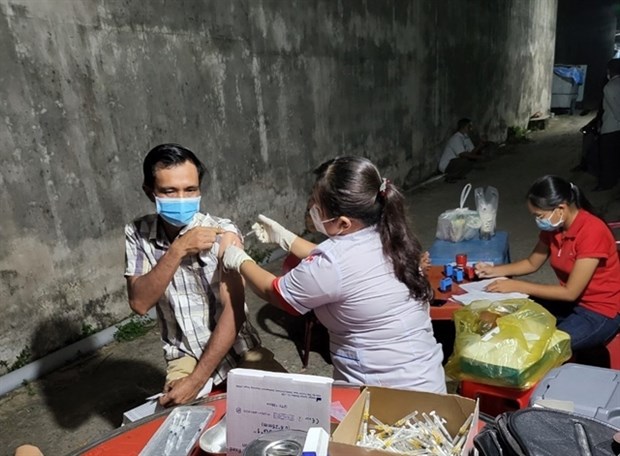
Vaccination against COVID-19 is a critical and decisive factor in reducing severe cases and hospitalisations in Vietnam, especially as the country reopens borders to international travel, the Ministry of Health (MoH) has said.
Vaccination against COVID-19 is a critical and decisive factor in reducing severe cases and hospitalisations in Vietnam, especially as the country reopens borders to international travel, the Ministry of Health (MoH) has said.
Minister of Health Nguyen Thanh Long said Vietnam had seen a rapid increase in the number of COVID-19 cases caused by the BA.2 mutation, with a very rapid spread compared to the original Omicron variant.
However, the number of COVID-19 hospitalisations has remained low due to the high vaccination rate. This showed the important role of vaccinations against COVID-19.
"In particular, as the country returns to normal, the ministry has shifted our approach to managing the risk of severity among COVID-19 patients instead of the previous approach focusing on the number of cases," the minister said.
He said that the health system had strengthened its capacity to control the pandemic and the mortality rate for COVID-19 patients.
Long said the ministry was building a plan on human resources and infrastructure to vaccinate children aged 5-11.
Those with underlying diseases and high-risk groups will also be injected with a fourth dose.
The ministry has assigned specialised agencies, scientific councils and experts to carefully research the vaccination plan in each stage and analyse the risks before implementing the vaccination drive.
On March 16, the Ministry of Health announced that more than 200 million COVID-19 vaccine doses had been administered in Vietnam, including 183.4 million in adults.
More than 17 million COVID-19 doses have been given to children aged 12-17 years. 8.7 million received the first dose, and 8.2 million the second.
In the Spring vaccination campaign, implemented from February 1 to 28, about 18 million doses were administered.
Long said Vietnam's COVID-19 vaccination campaign had been successful.
In terms of the approach to the COVID-19 vaccine, the country has multi-source access to vaccines approved by the World Health Organisation (WHO).
The country has allocated vaccines in different stages, prioritising vaccines for high-risk areas or groups to ensure flexible production.
Vietnam has successfully organised the largest-scale vaccination campaign in history.
"We have used the entire health system to participate in the vaccination campaign. The country has targeted to administer the booster to all adults by the end of this month," Long said.
"In terms of dissemination, media forces have done a good job, which helped those who were hesitant to get vaccinated against COVID-19 to go ahead and get it done."
Coordination among ministries, sectors and local authorities at all levels also contributed to the success.
Military forces have set up vaccine storage warehouses in military zones to transfer vaccines, ensuring that they are always available.
The speedy action of the grassroots party committees in vaccination work also added to the success of the vaccination campaign, he said./.
 |
| Medical workers give COVID-19 vaccine booster shots to migrant workers in Binh Duong province. (Photo: VNA) |
Minister of Health Nguyen Thanh Long said Vietnam had seen a rapid increase in the number of COVID-19 cases caused by the BA.2 mutation, with a very rapid spread compared to the original Omicron variant.
However, the number of COVID-19 hospitalisations has remained low due to the high vaccination rate. This showed the important role of vaccinations against COVID-19.
"In particular, as the country returns to normal, the ministry has shifted our approach to managing the risk of severity among COVID-19 patients instead of the previous approach focusing on the number of cases," the minister said.
He said that the health system had strengthened its capacity to control the pandemic and the mortality rate for COVID-19 patients.
Long said the ministry was building a plan on human resources and infrastructure to vaccinate children aged 5-11.
Those with underlying diseases and high-risk groups will also be injected with a fourth dose.
The ministry has assigned specialised agencies, scientific councils and experts to carefully research the vaccination plan in each stage and analyse the risks before implementing the vaccination drive.
On March 16, the Ministry of Health announced that more than 200 million COVID-19 vaccine doses had been administered in Vietnam, including 183.4 million in adults.
More than 17 million COVID-19 doses have been given to children aged 12-17 years. 8.7 million received the first dose, and 8.2 million the second.
In the Spring vaccination campaign, implemented from February 1 to 28, about 18 million doses were administered.
Long said Vietnam's COVID-19 vaccination campaign had been successful.
In terms of the approach to the COVID-19 vaccine, the country has multi-source access to vaccines approved by the World Health Organisation (WHO).
The country has allocated vaccines in different stages, prioritising vaccines for high-risk areas or groups to ensure flexible production.
Vietnam has successfully organised the largest-scale vaccination campaign in history.
"We have used the entire health system to participate in the vaccination campaign. The country has targeted to administer the booster to all adults by the end of this month," Long said.
"In terms of dissemination, media forces have done a good job, which helped those who were hesitant to get vaccinated against COVID-19 to go ahead and get it done."
Coordination among ministries, sectors and local authorities at all levels also contributed to the success.
Military forces have set up vaccine storage warehouses in military zones to transfer vaccines, ensuring that they are always available.
The speedy action of the grassroots party committees in vaccination work also added to the success of the vaccination campaign, he said./.
(Source:VNA)





